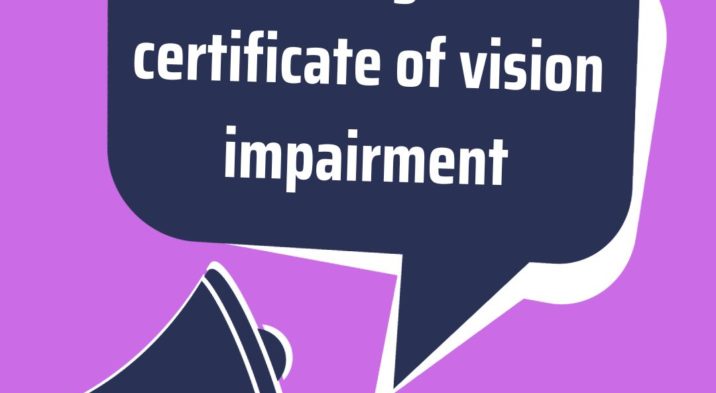
Living with a vision impairment can present unique challenges, but in the UK, various resources and support systems are in place to assist those with a visual impairment in accessing the help they need. One essential document is the Certificate of Vision Impairment (CVI), which serves as a gateway to vital services and support.
Understanding the Certificate of Vision Impairment (CVI)
The Certificate of Vision Impairment (CVI), also known as the BD8 form, is an official document issued by a consultant ophthalmologist. This certificate serves as an official recognition of your sight loss and plays a pivotal role in accessing various services and benefits.
Eligibility Criteria
An ophthalmologist (optician) will use a combination of both your visual acuity (a measurement of how well you can see detail) and your field of vision (the portion of space in which objects are visible at the same moment during a steady fixed gaze in one direction) to judge whether you are eligible to be certified, and at which level.
To be certified the best acuity and visual fields achievable with both eyes open is considered against the criteria, therefore if you can see well with one of your eyes then the criteria would not be met.
If you have a good visual acuity, you will usually have had to have lost a large part of your visual field in both eyes to be eligible to be certified.
Alternatively, if you have all your visual field, you will usually have to have a very poor visual acuity in both eyes to be eligible to be certified.
Generally, to be certified as severely sight impaired (blind), your sight must fall into one of the following categories, while wearing any glasses or contact lenses that you may need:
- Visual acuity of less than 3/60 with a full visual field
- Visual acuity between 3/60 and 6/60 with a severe reduction of field of vision, such as tunnel vision
- Visual acuity of 6/60 or above but with a very reduced field of vision, especially if a lot of sight is missing in the lower part of the field.
To be certified as sight impaired (partially sighted) your sight must fall into one of the following categories, while wearing any glasses or contact lenses that you may need:
- Visual acuity of 3/60 to 6/60 with a full field of vision
- Visual acuity of between 6/60 and 6/24 with a moderate reduction of field of vision, cloudiness in parts of your eye, or your lens has been removed and not replaced with a lens implant.
- Visual acuity of 6/18 or even better if a large part of your field of vision, for example a whole half of your vision, is missing or a lot of your peripheral vision is missing.
People who do not automatically meet the criteria may still be considered for registration under exceptional circumstances at the discretion of the consultant.
Can I get a CVI and register as sight impaired (partially sighted) if I have lost the sight in one of my eyes?
Many people who have sight in only one eye consider themselves partially sighted. However, an eye consultant will not be able to certify you as “Sight Impaired/Partially Sighted” because you would not meet the criteria unless you also have a significant loss of sight in your other eye. This is because both eyes need to be affected by loss of vision to meet the criteria for certification. The criteria for certification and registration are set nationally by the Department of Health and applied at the discretion of a consultant ophthalmologist.
If you have some loss of sight in your other eye as well then it is worth discussing the possibility of registration with your ophthalmologist.
The Process of Obtaining a CVI
1. Contacting a Consultant Ophthalmologist:
To initiate the process of obtaining a CVI, you’ll need to schedule an appointment with a Consultant Ophthalmologist. If you are not already under a consultant, you can obtain a referral to an ophthalmologist through your GP or Optician. Ophthalmologists specialise in eye conditions and can accurately assess the extent of your visual impairment.
In Wales people living with Bilateral Dry Age-Related Macular Degeneration can access a Certificate of Vision Impairment (CVI) in primary care optometry. An optometrist is a primary care provider who has specialised in detecting and correcting conditions that affect vision and eye health. They tend to work on the high street, or in hospitals eye clinics.
2. Ophthalmic Examination:
During the appointment, you will have a thorough eye examination to determine the severity of your vision impairment. This examination may involve various tests, including visual acuity tests, field of vision tests. The consultant may do other tests to check your eye health. This could mean they use drops to dilate (open) your pupils, which can blur your vision for a few hours afterwards. So, you may want to have someone with you to help you home after the appointment.
If your sight is affecting your ability to drive safely, you need to inform the DVLA on 0300 790 6806.
3. BD8 Form Completion:
If they confirm that your sight loss meets the criteria for a CVI, they will complete the BD8 form. This form includes essential information about your visual impairment and the ophthalmologist’s professional assessment.
4. Registration Authority:
The completed BD8 form is then sent to the local council sensory impairment team responsible for maintaining the Register of Blind and Partially Sighted People. This authority varies by region and is usually located within your local council or social services department. Your council will receive a copy of your CVI that was completed for you during your eye clinic appointment and should contact you within two weeks to talk to you about registration and the benefits of being registered.
Your council may also have an arrangement with another organisation to contact you on their behalf about registration. So don’t worry if its someone else who contacts you on the council’s behalf.
5. Notification and Support:
Once the registration authority receives and processes your BD8 form, you will be officially registered as Severely Sight Impaired (SSI) or Sight Impaired (SI), depending on the severity of your impairment.
6. Review and Updates:
Vision impairments can change over time, so it’s important to keep your CVI up to date. Regular eye examinations with your consultant ophthalmologist ensure that your CVI accurately reflects your current visual status.
Benefits of Having a CVI
Having a CVI offers several benefits, including:
Access to Services: A CVI grants you access to a variety of support services, including social services, mobility training, and educational assistance tailored to your needs.
Financial Assistance: Being registered as blind or partially sighted can make applying for financial benefits a little more straight forward if you don’t have any other health conditions. This could be help with disability benefits and concessions.
Assistive Devices: With a CVI, you may qualify for assistive devices like talking book services, screen reading software, and magnification tools.
Parking Permits/transport: Many local authorities provide parking permits for individuals with visual impairments, making it easier to navigate transportation. You could also be eligible for a bus pass through your authority, this would give you free travel in your local area.
Awareness and Advocacy: Your CVI can serve as an official document to raise awareness about your visual impairment and advocate for your needs in various settings.
Obtaining a CVI in the UK is a crucial step toward accessing the support and resources you need to lead a fulfilling and independent life despite your visual impairment. By following the outlined steps, you can navigate the process with confidence and take advantage of the assistance available to you. Remember, you’re not alone on this journey – there is a network of professionals and organisations ready to support you every step of the way, including us at Vision Support!



